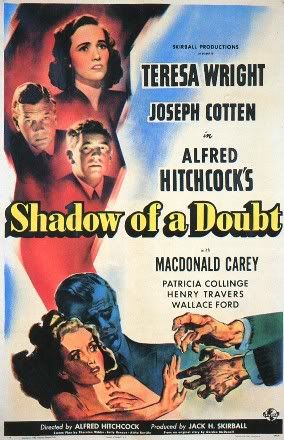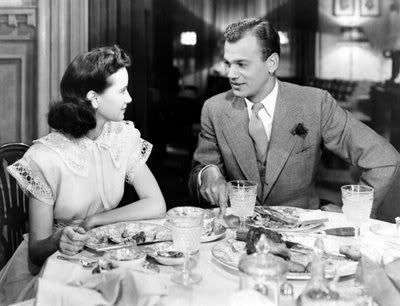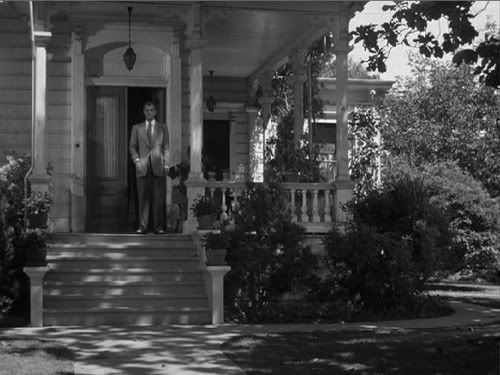Saturday, September 22, 2012
Shadow of a Doubt
Shadow of a Doubt
Director: Alfred Hitchcock
Starring: Teresa Wright, Joseph Cotten
1943
When Francois Truffaut interviewed his mentor Alfred Hitchcock, Hitchcock himself admitted that this film was his personal favorite. Indeed, the DVD extras have a featurette entitled “The Making of Hitchcock’s Favorite Film.” This is definitely a Hitchcock film in terms of suspense and danger, but there’s a lovely sense of restraint and understatement in it, as compared to his phenomenal – but flashy – films like Rear Window or North by Northwest.
Young Charlie (Teresa Wright) is bored to tears in her small town life, until her much beloved and fascinating namesake Uncle Charlie (Joseph Cotten – no, Microsoft Word, I did NOT spell that word incorrectly) decides to pay the family a little visit. Young Charlie is delighted, as is everyone else, until she starts to suspect that her uncle might be… well, he might be up to no good. A growing sense of dread and unease builds as young Charlie tries to grapple with conflicting feelings – before it’s too late.
The main reason Hitchcock claims this film as his favorite is its setting. Hitchcock both set the film AND filmed it entirely on location (a rarity in 1943) in Santa Rosa, California, which was true Small Town America at the time. There’s the church, the library, the courthouse, the bank, the main square, and the traffic guards. The family house was an actual house in town, not a set on a Hollywood backlot. It all rings so true – because it was! Therefore, when the threat of danger, REAL danger from Uncle Charlie’s mysterious background begins to spread, it’s much more unsettling. This is not a gritty big city where slime and filth are around every corner; these are the suburbs, for crying out loud! While modern films cannot get enough of exposing the seedy underbelly of the quintessential Small Town, Hitchcock definitely gets the award for doing it first. While he was at it, he also set the bar incredibly high. The menace of Charlie’s strange past is palpable as it starts to undo the safety of the family’s nest.
While Teresa Wright certainly gets more screen time and is undoubtedly the most central character, it is Cotten’s performance as Uncle Charlie that is most fascinating and really drives the film forward. When we first see him, he is lying on his bed in a rent-a-room building, staring silently at the ceiling in the middle of the day. What kind of a man is this? He is silent and brooding, answering his landlady with one or two words at a time. And yet, when he sees his family in Santa Rosa, he is all charm and smiles, outgoing and gregarious. In fact, we are so caught up with this new cheery persona of his, it’s all too easy to forget how somber and, well, menacing he was at the beginning of the film. Inscrutable, thy name is Uncle Charlie. Joseph Cotten (dammit, Word, stop autocorrecting me!!!) was more well known for playing supporting characters in Citizen Kane and The Magnificent Ambersons. Later in his career, he took on other starring roles, but he rarely played the heavy. Typically, as in The Third Man, he was well-meaning, well-intentioned, but somewhat foolish. He is certainly not foolish here at all, and he can go from genial to sinister in the merest of seconds. In my opinion, he was underused as a heavy. He does it so well!
Once again, reminding you that Hitchcock is the master of suspense is more than unnecessary, but there are so many wonderful suspenseful sequences in the film, and I need a segue to talk about them. Somehow, Hitchcock manages to make a classical music tune menacing and threatening, using it tover and over in the score for the film (I’m not telling you why). There’s a brilliant shot where Uncle Charlie stares at a ring on Young Charlie’s finger, the camera does a quick-as-lightning zoom onto her finger, Uncle Charlie frowns, and shivers go up your spine. Over a ring. That shot was certainly reminiscent of his breathtaking zoom to Ingrid Bergman’s hand holding the key to the wine cellar in Notorious.
Film noir had not yet fully formed in Hollywood, but it would only a year or two until the concept would reach its dizzying heights with Double Indemnity and Out of the Past. Do you consider Shadow of a Doubt film noir? I think there are many arguments that can be made in support of this classification. For one, the photography is so very, very noir. Wonderful, odd angles pop up frequently; shadows are used profusely. There’s one gorgeous shot of Uncle Charlie and Young Charlie talking on the front porch at night. The lamp above them somehow only manages to light up Young Charlie’s face; Uncle Charlie remains significantly in the shadows.
Lastly, I cannot forget to mention two wonderful supporting characters: Young Charlie’s father Joe (Henry Travers) and his friend and neighbor Herb (Hume Cronyn). Both are men obsessed with unsolved crime and the perfect murder to the point where Herb regularly interrupts the family dinner to bring Joe a new book or discuss a new plot. The two regularly go off on very intense but comical discussions of the best means of murdering someone; Joe prefers hitting someone on the head with a blunt instrument, while Herb goes in more for poisons. Compared to the tension that has built between Young and Uncle Charlie, these morbid discussions are downright hysterical and welcome and well-placed little moments of levity.
Made in America, this film was after Hitchcock’s initial British films phase, but before he reached the true artistic height of his career with his stretch of great American-produced films. Nevertheless, it is a high point in his career, and a very interesting film. Great, great Hitchcock.
Arbitrary Rating: 8.5/10
Subscribe to:
Post Comments (Atom)




Good review. This might not make my Hitchcock Top 5, but it was still a good movie with some really good tension in it.
ReplyDeleteI agree. I really like it, it's not Top Hitch, but very good.
DeleteVery interesting review. I think we saw the same behind the scenes featurette. It is a facinating backstory.
ReplyDeleteI suppose there are noir elements, but what I really noticed were all the tricks Orson Welles practiced in his two preceeding movies. The angles and the depth and the shadows. The camera and lighting are telling a story all on their own. I will have to think a bit about the noir stuff.
totally agree on Joe Cotten. I prefer him as the baddie. He is so awesome.
I do enjoy this one. Cotten as the presumed villain is very fun. And GAD, the shadows!!! Great cinematography!!
Delete